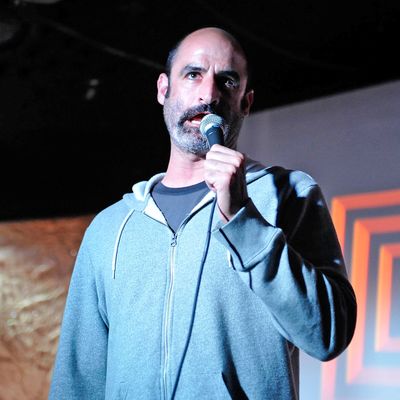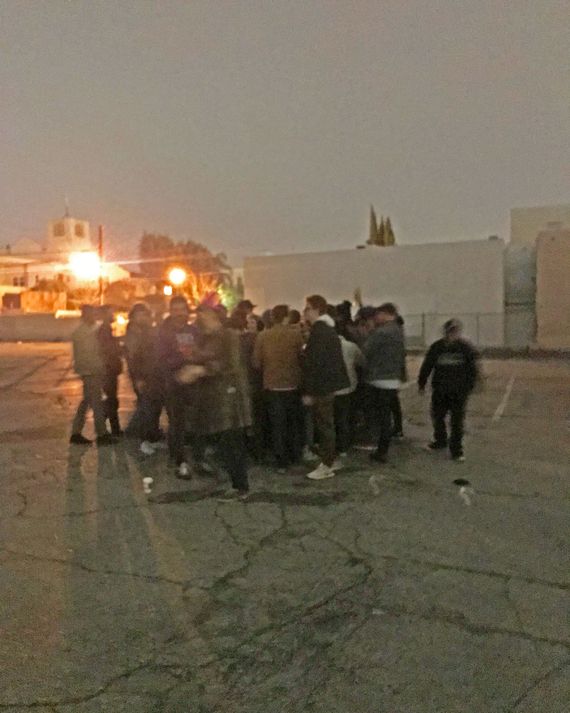
It is raining in Los Angeles. Even so, 80 people have gathered in the dark in the parking lot of an abandoned comedy theater to celebrate the memory of comedian Brody Stevens. There will be other memorials at different venues, but this one is theirs. They are a mix of fans, longtime friends, and fellow comics who performed with Stevens for years in the L.A. alternative-comedy scene, in bars and black-box theaters and the back of comic-book stores. Stevens was equally at home there as he was in the Improv, the Laugh Factory, and his beloved Comedy Store. If L.A. comedy  was like politics, separated into parties of club rooms, alt rooms, and sketch kids, says comic Josh Fadem, no performer reached across party lines and bridged the gaps more than Brody Stevens.
The parking-lot crowd stands, listens, and laughs. StevensÔÇÖs friends take turns telling stories about him and what he meant to them. There are no lights and no microphone. ItÔÇÖs fitting; Stevens never needed one. They tell his jokes and remember moments that capture his essence. They describe his constant policing of negative energy from audience members. Fadem recalls how Brody would single them out and challenge their body language. ÔÇ£Crossed arms! NEGATIVE!ÔÇØ he would yell at one, then call out another for ÔÇ£looking at the floor! Bored!ÔÇØ When the chastened spectators would reengage with the show he would praise them: ÔÇ£She gets it! SheÔÇÖs all right!ÔÇØ Fadem remembers a bar show where a sparse, indifferent audience was not giving comic Judah Friedlander what Stevens thought he deserved. Brody interrupted from the back, admonishing the entire room: ÔÇ£MY FRIEND JUDAH IS VERY FUNNY! SHOW HIM SOME RESPECT!ÔÇØ
Stevens demanded so much of an audience because he gave them so much of himself. ÔÇ£Positive energy!ÔÇØ he would yell during a performance. It was both a mantra and a challenge, to himself and the crowd, to make the experience they were creating together the best it could be. ÔÇ£I give to YOU. Get in to ME,ÔÇØ he would say, putting into words the basic human transaction at the root of a live performance. He knew the best comedy experiences happen when that exchange of energy is equal, and he did everything he could to get it there.
His style was unique. Comedy-industry veteran Dave Rath says, ÔÇ£No comic will ever have his mix of silliness and deep emotional honesty.ÔÇØ Comedian Dean Delray calls BrodyÔÇÖs approach ÔÇ£so organic and free.ÔÇØ Stevens never used a set list. Whatever he thought the crowd needed in that moment he would throw at them. It could be a self-deprecating one-liner like, ÔÇ£IÔÇÖm a model ÔǪ IN SERBIA,ÔÇØ or a complete absurdity like, ÔÇ£Some comics are big on Black Twitter. IÔÇÖm big on Gay Venmo!ÔÇØ It could be a hilarious peek into his real-life issues. ÔÇ£I have problems! FAMILY PROBLEMS,ÔÇØ he would bellow. ÔÇ£You donÔÇÖt own the condo, Stephanie! MOM OWNS THE CONDO.ÔÇØ He delivered all of this in a trademark rhythmic bark somewhere between a ringmaster, a drill sergeant, and a 1970s sportscaster. Comic Jason Sklar remembers, ÔÇ£He would actually say to the audience, ÔÇÿI should be getting laughs on CADENCE ALONE!ÔÇÖ and he was right!ÔÇØ
Theater professionals talk about a figurative fourth wall separating the performers from the audience. This did not exist for Stevens. He would step off the stage as needed, pushing into the audiences space. He might skip words altogether and pound a chair with drumsticks to a favorite song, pumping energy into the room. According to Fadem, Stevenss jokes, crowd work, his true feelings in the moment, and letting the most unhinged pieces of himself be exposed could at any moment  be used as colors on a palette from this great artist.
Stevens honed these skills in the grueling crucible of audience warm-up. A dirty secret of the television industry is that the live audience of your favorite programs are not all fans of the show. Large portions consist of people who were promised 20 bucks to sit in a room for three hours and plan to do it again at a different show tomorrow. They donÔÇÖt care one bit about what they are watching, and on shows like @midnight, Chelsea Lately, and The Jeselnik Offensive, StevensÔÇÖs job was to make them. He attacked this problem with everything he had. ÔÇ£Brody turned audience warm-up into an art form,ÔÇØ comic Steve Agee says. He would start outside, before the audience was even in the room, walking up and down the line, telling jokes as they filed in the building. After years of youth baseball, Stevens knew Southern California geography like a human Google Maps. He would ask audience members where they went to high school and then rattle off facts only someone who went there could know: their area code, their mascot, the Del Taco across the street. They would light up. If this warm-up guy put in that level of effort, the least they could do was laugh. Anthony Jeselnik remembers, ÔÇ£There were a few times where Brody couldnÔÇÖt be there and we had to find a replacement, and we all just knew the episode would be worse even though he never appeared on camera.ÔÇØ
Stevens was a lifelong athlete. When Agee first met Stevens, he found him very aggressive. He seemed more like a jock than a comedian. As the years went on, and I saw him perform more regularly, I realized that he was, in fact, equal parts jock and comedian. A former pitcher for Arizona State, Stevens never lost his athletes discipline. Comic Benji Aflalo says, He created rules for himself to follow  Be positive. Be in the moment. Give them your energy. He followed them whenever he performed, which was almost every single night.
In a scene plagued by opportunists, Stevens never treated anyone differently because of status. ÔÇ£Brody wasnÔÇÖt just your ÔÇÿfriend,ÔÇÖ he was truly your friend. He made the effort outside of comedy to check in, get coffee, go hiking,ÔÇØ comedian Sandy Danto recalls. Delray remembers, ÔÇ£I was in NYC all last year and was feeling homesick and down,ÔÇØ but he did a show with Stevens, and ÔÇ£as soon as we hung out I instantly felt so much better.ÔÇØ According to Sklar, ÔÇ£Every time you met he greeted you, first and last name. He made you feel important. I defy you to name another comedian, who when you saw him onstage, whether he was killing or bombing, made you as happy and proud to be a comedian.ÔÇØ
Jeselnik says Stevens treated comedians who were new to the scene the same way: ÔÇ£He was so supportive, especially to younger comics. He immediately treated me like an equal and I loved him for it.ÔÇØ Aflalo echoes this, saying, ÔÇ£When youÔÇÖre starting out in comedy, youÔÇÖre lost, and you donÔÇÖt even know it. When I started working as a doorman at the Comedy Store, people were really mean to me. Brody was the first established comic to treat me like a friend. When he liked you, it felt good.ÔÇØ
Remarkably, Stevens did all of this while struggling daily with mental illness. He said his positivity catchphrases as much to convince others to be positive as  to try to convince himself, says Danto. He had a lot going on in his head, but no matter how down he got or manic or how much he fought to be himself  he always found a way to be genuinely and very funny.
At the parking-lot memorial, some of the speakers talked about StevensÔÇÖs demons. Producer Cash Hartzell said, ÔÇ£Depression is a liar. It tells you no one loves you. And everyone loved Brody Stevens.ÔÇØ Comedian┬áHoward Kremer, who organized the event, told the crowd that some of the things they loved about Brody ÔÇö his drive to be onstage as much as possible, his diligent attention to friendships, his commitment to positivity ÔÇö were partly strategies in his struggle with depression. ÔÇ£He needed to be the way he was to fight it, and we all benefited from the by-product of that battle.ÔÇØ
Comedy has suffered a great loss. ÔÇ£IÔÇÖm utterly devastated and heartbroken,ÔÇØ says Comedy Store manager Adam Eget. Looking back on their friendship together, Esther Povitsky remembers, ÔÇ£We picked each other up so many times over the last decade, and I am hurting so deeply that I was not there to pick him up this time.ÔÇØ Aflalo says heÔÇÖs ÔÇ£been really having a hard time with his death,ÔÇØ but StevensÔÇÖs own words help him cope. The same words Brody used to fight dark feelings for so long can help us with the dark feelings left by his absence. ÔÇ£Positive energy,ÔÇØ says Aflalo. ÔÇ£Positive push!ÔÇØ
There is a clich├® that many comedians are troubled and despondent and that this should make us sad. This is backwards. The truth is that comedy is an outlet that can help some troubled and despondent people feel a sense of purpose, bring joy to themselves and others, achieve great things, and form meaningful friendships when these things might not have happened otherwise. That should make us happy and grateful. Brody Stevens made me happy, and I am grateful for Brody Stevens.


